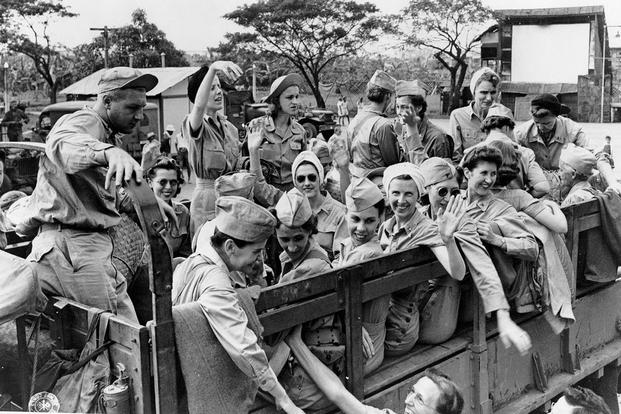At Sternberg General Hospital in Manila, Philippines, life for military nurses before World War II was not exactly hardship. In the midst of beaches, palm groves and country-club-like sports facilities, U.S. Army and Navy nurses performed routine duties. Their second-in-command, Lt. Josephine "Mama Josie" Nesbit, relished the fun her "girls" had and made sure they were all comfortable and in good health.
All luxuries of tropical life vanished, however, when the Japanese attacked the Philippines on Dec. 8, 1941. The Army hospital at Fort Stotsenburg suffered a three-hour air raid, and a large number of casualties ensued. Nesbit's chief, Maude Davison, sent several nurses to assist. Meanwhile, the Japanese forces were approaching Manila from the north. As reports of mass casualties from Pearl Harbor came in, Nesbit tried to calm her staff: "Girls, you've got to sleep today. You can't weep and wail over this, because you have to work tonight."
Such no-nonsense talk was typical of the woman all ranks knew as "Josie." Tall and formidable, with a size-13 shoe, Nesbit combined her sensible military demeanor with a soft maternal affection for her nurses. In 1941, she was "a well-traveled 46-year-old second lieutenant with 22 years of military service," as Elizabeth Norman describes her in "We Band of Angels: The Untold Story of the American Women Trapped on Bataan."
Nesbit's military service had prepared her to follow orders. When Bataan fell to the Japanese, the nurses, along with the 80,000 Allied troops defending the peninsula, were ordered to retreat to the island of Corregidor. At Bataan's Hospital #2, Nesbit was ordered to report to Col. James E. Gillespie, the medical commander. "Tell your American nurses to get down here to my office by 20 hundred hours and only take whatever they can carry in their hands," he said.
"What about my Filipino [sic] nurses?" Nesbit demanded. The colonel cut her short: "Only American nurses." Nesbit had heard enough. She squared her shoulders and replied, "If my Filipino nurses don't go, I'm ... not ... going ... either." Gillespie called headquarters and received permission to evacuate all the nurses -- Americans, Filipinas and the civilian women working with them.
Want to Know More About the Military?
Be sure to get the latest news about the U.S. military, as well as critical info about how to join and all the benefits of service. Subscribe to Military.com and receive customized updates delivered straight to your inbox.















